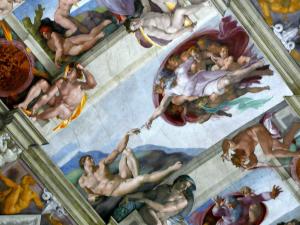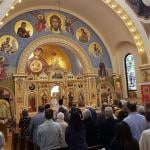
Jayaprakash R: The Creation Of Adam / flickr
We are called to know ourselves, for in knowing ourselves, we will come to know God. Why is this so? Because we are made in the image and likeness of God. We are, of course, not God by nature, and so God transcends us, but we represent God in such a way that if we know ourselves, we will be able to know something about God. It is important to keep both God’s transcendence and God’s representations in creation, including in ourselves, in a delicate balance. This makes sure God is not treated as some absolute with no relationship with us, but also, makes sure we do not confuse what we learn about God in and through ourselves as the fullness of who and what God is. God is apprehensible even if God is not comprehensible. The better we know ourselves, the better our apprehension of God will be. And through that apprehension, we will be able to partake in and realize the reflected glory of God which is in us, which is why Abba Poemen was right in saying, “It is a great glory that man should know his measure.”[1]
We should know our measure. We should know who we are. The more we do so, the more we will see who we are as a person, and not an individual, that is, the more we will realize who we are must include what we do and how we relate with others. For we are not cut off from others, as islands unto ourselves; we are persons, and to be a person is to be relational. The more we think of ourselves merely as individuals, the less we will know ourselves, and this will lead us to an incorrect, indeed, false apprehension of God as we will try to have God turned into an absolute individual with no way to relate to anyone else. God is personal, not some individual monad, and that personal reality is best understood as the way God is revealed as love, as that love has both an internal (the three persons of the Trinity loving each other) and external (creation) reference point. God is love because God is found to be three persons relating to and united with each other thanks to their love, and in and through that united love, creating and embracing creation, sharing their love for each other with that which they create together. We will not be able to appreciate this so long as we are stuck in an individualistic mindset, that is, as long as we do not know ourselves as we are as persons.
Thus, if we want to better understand the relationships of the persons of the Trinity with each other, and how their relations work to unite them, we must embrace our relationships with others. The more we do so, the more we will understand how relationships are formed, how they can bring people together, and show that they are essentially the same despite their relative distinctions. We will realize our own full personal being, that is, how we imagine and represent God, when we open up to others in and through love, for then we will be reflecting the image and likeness of God, the image and likeness of divine love, in our activity. That is, when we live and thrive as persons who engage others, be it God or our fellow creatures, with love, the more we will realize our true selves and come to know ourselves as God intends us to be. When we resist and act against such love, when we fail to love our neighbors as ourselves, sin ties itself to us, causing us no longer to be at peace, either with our neighbor, with the world at large, or with ourselves. We become self-absorbed and destructive. We try to manipulate and control what is around us, and in doing so, we will find ourselves not only out of harmony with God, out of harmony with our neighbor, but out of harmony with the rest of creation. Nothing will truly be as we want it to be. We will try to create a world based upon our desires, but as that world will never exist, and insofar as it doesn’t exist, we will suffer, creating, as it is, our own private hell.
We must, therefore, build upon love. That love will have us bear many things, and in doing so, help become a vessel of peace, not just for others, but also for ourselves. And in doing so, we will find we are able to act in harmony with the world around us, so that, as Abbe Poemen also said, we will be able to live with and interact with “beasts” and establish peaceful harmony with them:
A brother asked Abba Poemen, saying to him: ‘How can a man be at peace with a brother who lives with him?’ Abba Poemen said to him: ‘If a man can bear his [brother’s] insolence, then he can live with beasts, not only people.’[2]
The lives written of the saints are full of such loving, peace-building saints, of those known for their compassion for and embrace not only of their neighbor, but of animals, indeed, of all living things. The found a way to live in peace and harmony with others, and in doing so, not only were they filled with peace, but also all kinds of joy. They represent, in part, what God wants for us, to truly find a way to embrace others, and in doing so, embrace our true selves, selves which exist in and through loving relationships with others (including the whole of creation around us). God didn’t just create us. God created a wonderous variety of creatures, each with their own glory, each with their own good which should be protected and preserved, and the more we understand who and what we are, the more we will end up looking after and taking care of the “beasts” around us because of the good which they have been given. We can see an aspect of this in the way many of us have pets which we take care of and love. While, to be sure, there can be and is often abuse involved with the way some take care of (or sell) animals, what is important for us here is that there are those who can, and do, have a great, balanced, and loving relationship with their pets, those who know, likewise, their pets (in their own way) care for and look after them. This shows us the potential we have to live and be with the “beasts” of the earth. To be sure, there are some holy saints who have an even greater relationship with animals, some who seemingly can talk with them in some fashion or another, and in doing so, reveal the animal world is more complicated, more sophisticated, more capable of understanding the world around them than many of us want to admit. This is exactly what we should strive to be like. For then, we will know, because we can transcend the differences we have with animals and form loving bonds with them, we will also come to understand God even better, for we will understand how God can and will come to have a relationship with us despite the vast differences between us and God.
[1] More Sayings of the Desert Fathers. An English Translation And Notes. Ed. John Wortley (Cambridge: Cambridge University Press, 2019; repr. 2023), 166 [“Sayings Preserved in Ethiopic”: E97].
[2] More Sayings of the Desert Fathers, 167 [“Sayings Preserved in Ethiopic”: E102].
Stay in touch! Like A Little Bit of Nothing on Facebook.
If you liked what you read, please consider sharing it with your friends and family!
N.B.: While I read comments to moderate them, I rarely respond to them. If I don’t respond to your comment directly, don’t assume I am unthankful for it. I appreciate it. But I want readers to feel free to ask questions, and hopefully, dialogue with each other. I have shared what I wanted to say, though some responses will get a brief reply by me, or, if I find it interesting and something I can engage fully, as the foundation for another post. I have had many posts inspired or improved upon thanks to my readers.













